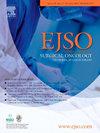Molecular biology of cholangiocarcinoma and its implications for targeted therapy in patient management
IF 3.5
2区 医学
Q2 ONCOLOGY
引用次数: 0
Abstract
Cholangiocarcinoma (CCA) remains a devastating malignancy and a significant challenge to treat. The majority of CCA patients are diagnosed at an advanced stage, making the disease incurable in most cases. The advent of high-throughput genetic sequencing has significantly improved our understanding of the molecular biology underpinning cancer. The identification of ‘druggable’ genetic aberrations and the development of novel targeted therapies against them is opening up new treatment strategies. Currently, 3 targeted therapies are approved for use in CCA; Ivosidenib in patients with IDH1 mutations and Infigratinib/Pemigatinib in those with FGFR2 fusions. As our understanding of the biology underpinning CCA continues to improve it is highly likely that additional targeted therapies will become available in the near future. This is important, as it is thought up to 40 % of CCA patients harbour a potentially actionable mutation. In this review we provide an overview of the molecular pathogenesis of CCA and highlight currently available and potential future targeted treatments.
胆管癌的分子生物学及其对患者管理中靶向治疗的影响
胆管癌(CCA)仍然是一种破坏性极大的恶性肿瘤,也是治疗上的一大挑战。大多数 CCA 患者在确诊时已是晚期,因此在大多数情况下无法治愈。高通量基因测序技术的出现大大提高了我们对癌症分子生物学基础的认识。发现 "可药物治疗 "的基因畸变并开发针对这些畸变的新型靶向疗法,为我们开辟了新的治疗策略。目前,有 3 种靶向疗法获准用于 CCA:Ivosidenib 用于 IDH1 基因突变的患者,Infigratinib/Pemigatinib 用于 FGFR2 基因融合的患者。随着我们对 CCA 生物学基础的了解不断加深,很有可能在不久的将来会有更多的靶向疗法问世。这一点非常重要,因为据认为多达 40% 的 CCA 患者存在潜在的可采取行动的突变。在这篇综述中,我们概述了 CCA 的分子发病机制,并重点介绍了目前可用的和未来潜在的靶向治疗方法。
本文章由计算机程序翻译,如有差异,请以英文原文为准。
求助全文
约1分钟内获得全文
求助全文
来源期刊

Ejso
医学-外科
CiteScore
6.40
自引率
2.60%
发文量
1148
审稿时长
41 days
期刊介绍:
JSO - European Journal of Surgical Oncology ("the Journal of Cancer Surgery") is the Official Journal of the European Society of Surgical Oncology and BASO ~ the Association for Cancer Surgery.
The EJSO aims to advance surgical oncology research and practice through the publication of original research articles, review articles, editorials, debates and correspondence.
 求助内容:
求助内容: 应助结果提醒方式:
应助结果提醒方式:


